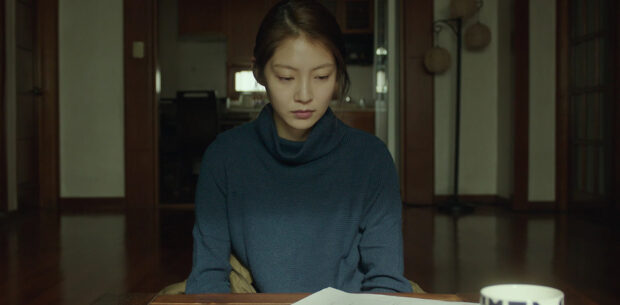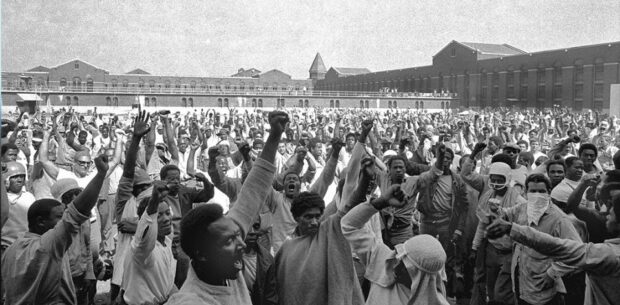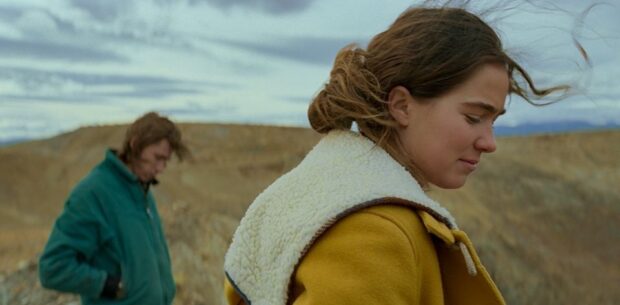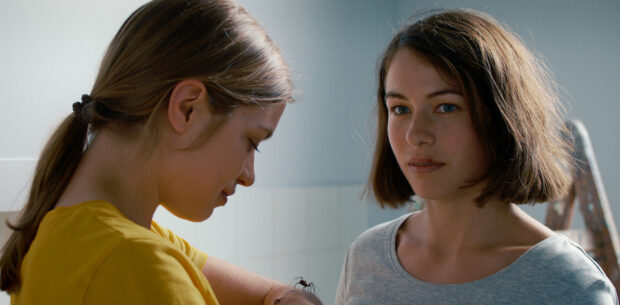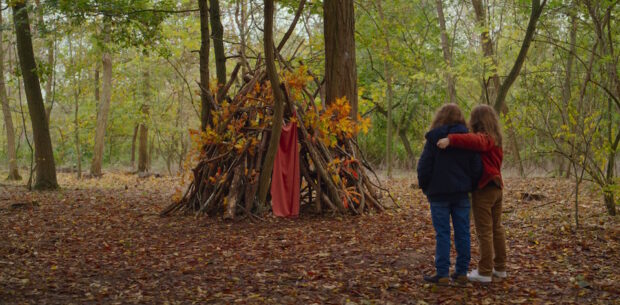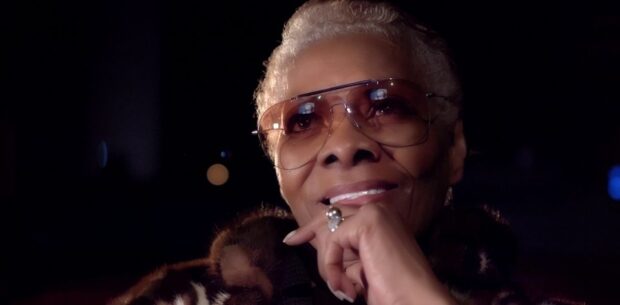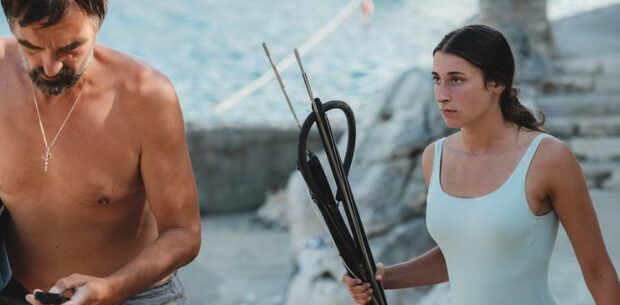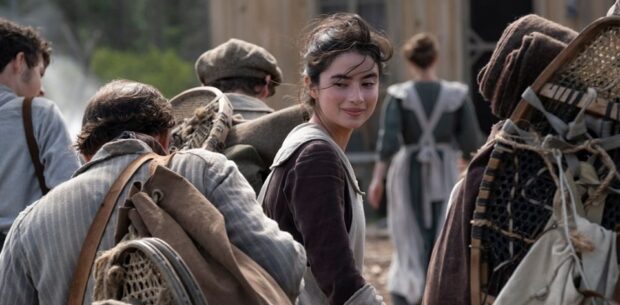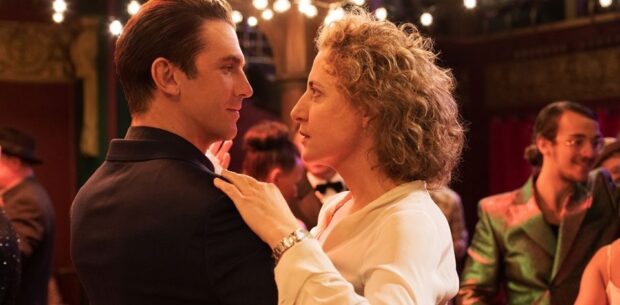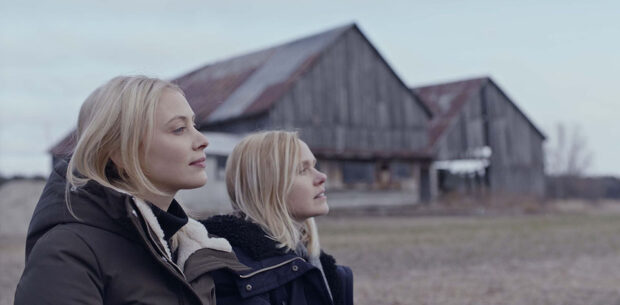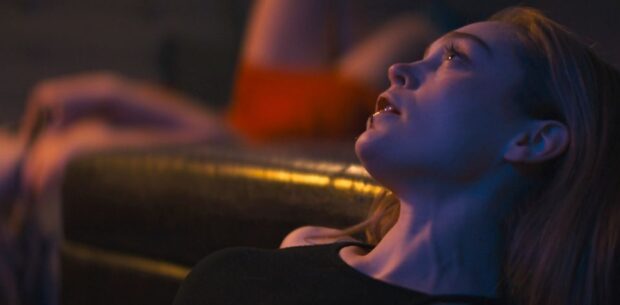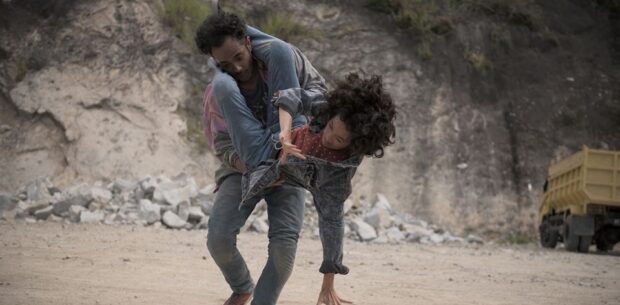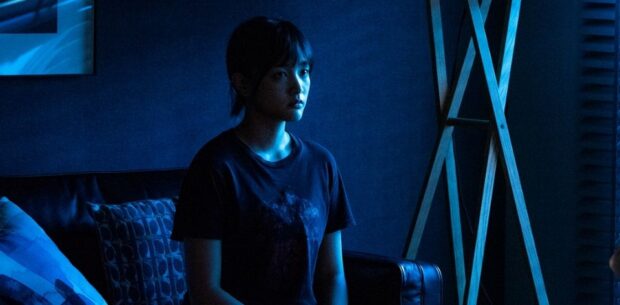The Toronto International Film Festival (TIFF) is unquestionably one of the top showcases for film in the world. For their 2021 edition, they not only welcomed people back to in-person screenings, but also showcased some of their online selection for press and punters alike.
As headliners like Last Night in Soho, Dune, The Power of the Dog and The Eyes of Tammy Faye swept the popular votes and circles of buzziness, the festival was back with a hybrid bang*. Yet there were also gems from around the world: Justine Bateman’s debut Violet, Hong Sung-Eun’s Aloners and Scott McGehee and David Siegel’s Montana Story. We saw upcoming television episodes in South Korea’s Hellbound. Closer to home, we recalled the ‘Black Summer’ of bushfires in Eva Orner’s Burning.
Our massive thanks to the TIFF publicity team, who provided access to screeners and copious materials throughout the festival’s run.
So, without any further ado, here’s a look at all of the films we managed to catch at TIFF 2021. Links to full reviews are found alongside the capsules. You can also see the rest of our coverage at our TIFF hub.
*If we haven’t covered here, we either didn’t catch it or it wasn’t made available to international press.
Violet
An impressive feature directorial debut from Justine Bateman. From the gut punch of an opening, set to Venetian Snares, this is a rare debut that gets inside your head while also exploring the interiority of a character. What the titular Violet refers to as “the committee in my head” comments, and is often at war, over a sea of micro (and macro) aggressions in her Hollywood job. It’s a perfect film for the moment, but it will also speak to anyone who has that nagging voice driving their anxiety and another that just wants to break free. Read our full review.
Aloners
The art of the struggle of being alone is explored with a floating intimacy in Hong Sung-Eun’s debut feature. The phenomena described in Hong’s film is so common there’s a name for it: honjok. The term, which refers to people who engage in typical social activities — eating, drinking, leisure trips — alone. The film is a collection of moments that add up to a major shift but could just as easily have gone in the other direction. Lead character Jin-A ultimately works to break a cycle that was taught to her, and eventually concludes with some irony that “I just need some time to myself.” Read our full review.
Attica
It’s been 50 years this month since the uprising at the titular prison, and the fight for prisoner rights continues. It’s remarkable that Stanley Nelson (Miles Davis: Birth of the Cool) and his team were able to assemble so many eyewitnesses five decades on. Yet these people are the heart and soul of this incredibly raw oral history of a moment. The last half of the film, where prisoners and witnesses alike break down over the memory of the event, manages to rend your heart while making you angry at the system that allowed it.
Montana Story
Scott McGehee and David Siegel’s (What Maisie Knew) unassuming and beautifully shot film is a two-hander character study that gets to the heart of the conflict between grief and resentment. Backed by the stunning cinematography of Giles Nuttgens, whose striking photography has been a character of equal footing in films like Hell or High Water, it’s hard not to get swept up in Haley Lu Richardson and Owen Teague’s slow-burning performances. Read our full review.
Hellbound
The creator of Train to Busan goes straight to Hell in this intriguing supernatural series. Co-created by Yeon and Choi Gyu-seok (Awl), adapting Yeon’s own webtoon, it begins as three hulking demonic figures appear out of the ether, beat down a fellow fleeing from a café, and leave nothing but a pile of ashes. It soon emerges that people are hearing predictions of when they will die, and these monsters are sending those people straight to hell. Coming soon to Netflix, check out our advanced review.
The Girl and the Spider
If you have ever moved house, you can confirm that it is exactly as tense as this. In this German film, the Zürcher brothers have bottled the uncertainty of moving house and magnified it several times in a psychological drama. As Lisa (Liliane Amuat) moves out of the apartment she has shared with Mara (Henriette Confurius), we witness their activities over the course of two days and a night. People come and go, past and current relationships are exposed, and everyone feels like they are going through some kind of ritualised play. Read the full review.
Petite Maman
Céline Sciamma (Portrait of a Lady on Fire) returns to demonstrate her mastery and innate understanding of formative childhood moments, interior life and familial bonds. Sciamma manages to achieve all of this in a tidy 72 minutes. Reflecting the diminutive co-stars, the filmmaker packs a big emotional journey into a small package. Not that we needed any confirmation, but Sciamma solidifies her reputation with another amazing achievement that speaks to the child in us all. Read the full review.
Burning
Eva Orner’s film should should make you angry. The summer of 2019/2020 in Sydney is still so vivid for me, and most Australians. The bright orange skies. The constant cover of smoke for over three months. Having to wear masks outdoors was a ill omen of what the rest of 2020 and 2021 would bring. Systematically chronicling every decision Prime Minister Scott Morrison made in the lead-up to a potentially preventable disaster, the film casts the Liberal government as a group that listened to mining interests and while refusing to address the climate crisis literally burning around them. If anything, there were probably grounds for this to go even further, and while it doesn’t offer any radical departures from media coverage so far, it will stand as a record of a moment in time. Read our full review.
Dionne Warwick: Don’t Make Me Over
Terrific overview of Warwick’s life and career, complete with an impressive range of talking heads. However many songs you think that she’s done, the film keeps reminding you that there’s more. An impressive array of talking heads happily contribute to the telling of that story, including Cissy Houston, Snoop Dogg, Olivia Newton John, Elton John, Burt Bacharach, Stevie Wonder, Carlos Santana, Barry Gibb and Bill Clinton. Genuinely touched by Snoop’s heartfelt desire to make her proud. No mention of Twitter, where Warwick is currently doing some fine work.
Murina
You may watch this because it won the Camera d’Or at Cannes this year. Or turn up for the ‘produced by Martin Scorsese’ credit. Yet you’ll stay for Antoneta Alamat Kusijanović’s engaging and often quite intense coming of age story set against the beautiful locales of the Croatian Islands. It’s shot by cinematographer Hélène Louvart,a regular collaborator with Eliza Hittman. In fact, that’s probably the vibe here: think Beach Rats by way of Céline Sciamma and her contemporaries.
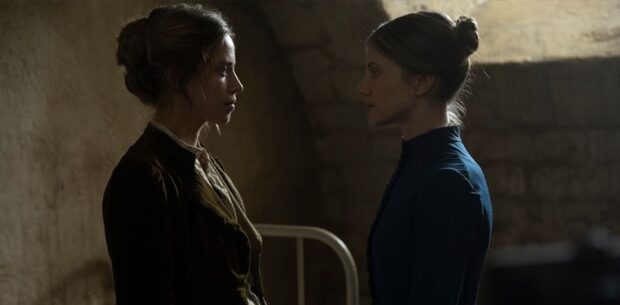
The Mad Women’s Ball
There is a lot to love about Mélanie Laurent’s melodrama. Opening with a striking shot of Victor Hugo’s funeral, it quickly places Eugénie (Lou de Laâge) in psychiatric treatment when her fierce opinions and insistence that she sees spirits is too much for her conservative father. The majority of the film is set in the asylum for women, where the brutal tortures disguised as therapy are a microcosm for institutional structures used to disenfranchise women and rob them of power. As such, it clearly resonates with modern audiences, albeit it fails to really address Eugénie’s class privilege in its neat resolution.
The Guilty
Antoine Fuqua’s remake of Gustav Möller’s 2018 film is a mostly one-room thriller (there’s two rooms really, but one’s kind of an annex). It uses the material well, and not knowing the twists and turns going in is probably a good thing. It’s almost an acting exercise for lead Jake Gyllenhaal, who speaks to several unseen celebrities (Riley Keough. Ethan Hawke, Peter Sarsgaard, Paul Dano, Bill Burr) via the phone. So, if you think of it as a celebrity emergency call-in podcast, Fuqua may have just recreated 2020 in under 90 minutes.
Maria Chapdelaine
Based on the classic Canadian novel, Sébastien Pilote’s adaptation (at least the fourth) is gorgeously shot by Michel La Veaux in the Saguenay–Lac-Saint-Jean region of Quebec. At 158 minutes, the measured pace might be a barrier to some, although it’s ironic that some story compression makes other parts feel rushed. Yet there’s a central beauty here that’s hard to ignore, and we are sure to see newcomer Sara Montpetit more in the future.
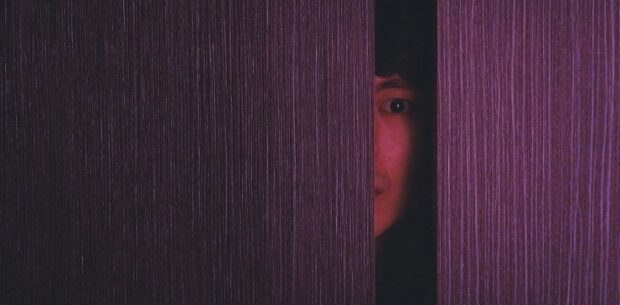
Terrorizers
There’s been a bunch of hyperlinked films on the festival circuit this year, including Spaghetti Code Love and Come and Go at the JAPAN CUTS fest last month. This Taiwanese film perhaps references the 1986 award-winning Edward Yang film of the same name, one in which also looked at connected lives across Taipei. Yet this is not just about those invisible connections, with Ho digging into some other social issues in the process. It links the lives of several people across Taipei through a violent act and the source of that violence. Read the full review.
The Survivor
Barry Levinson’s film works strongest as a performance piece for Ben Foster, who is excellent in this mostly engaging tale of a Holocaust survivor. Levinson’s introduction for the film made it clear that he had some personal affinity to the material, a biopic of boxer Harry Haft that spans the Second World War and his post-war career. Yet the order of the narrative gets a little muddled along the way, diminishing some of the impact of the genuinely emotional gut-punches.
I’m Your Man
This high-concept romantic comedy, much like the titular man, never goes quite where you think it’s going to go. Which is much of the charm of this mostly two-hander, in which Eggart and Stevens are impeccable. If anything this would have made a killer episode of something (trying not to say Black Mirror, but there you go), but as a feature it leaves us on an ambiguous warm note.
All My Puny Sorrows
This adaptation of an award-winning Canadian novel brings with it much of the source material’s language as well as its unique mix of sorrow and humour. While some viewers may struggle with the arm’s length approach McGowan takes with the difficult material, ALL MY PUNY SORROWS will no doubt resonate with many a viewer (and reader), and if it speaks to your truth then this is unquestionably a good thing. Read the full review.
Kicking Blood
A vampire tries to kick the habit while helping an alcoholic recover. Blaine Thurier’s film is certainly one of the more original takes on the vampire genre, and it feels like a film displaced in time. It’s a little bit like a 21st century low-budget indie version of The Hunger by way of Leaving Las Vegas with some genuinely interesting results. The fact that the lead vampire works in a pubic library won my human heart over immediately, but the stylish photography and Alanna Bale’s captivating lead performance held me in place.
Vengeance is Mine, All Others Pay Cash
On paper, this Indonesian film (from the singularly named Edwin) is totally up our alley. As weird as this movie sets out to be, the reality is far removed from whatever it is that you are expecting. A much more measured pace than one would think for a film with that title, this tip of the hat to 80s action is downbeat to say the least. Still, Edwin’s ability to subvert expectations is sure to make this a cult favourite.
The Red Filter is Withdrawn
Notions of colonialism infuse Kim Min-jung’s short film, one that is based on René Magritte’s La condition humaine. It captures landscapes of caves and bunkers in Jeju Island and contains quotes from Hollis Frampton’s A Lecture performance script.
Charlotte
A really fascinating subject — Charlotte Salomon is arguably one of the pioneers of sequential art with Life? or Theater? — gets a fairly straightforward telling. The best aspects are the visuals, drawing on Salomon’s own work and bleeding onto the screen in watercolour spills and intricate cascades. This version screened for the press was the English language dub featuring Keira Knightley, and some of the supporting voices were a little stiff in my mind.
The Falls
We may be the outliers on this one, but Chung Mong-Hong’s melodrama was a bit of a mixed bag. It was great to see a Covid Era film that acknowledges the pandemic but only uses it as a springboard to something else. Most of the film is about a mother and daughter relationship that becomes rocky as the former slips into an unspecified mental illness. Yet there’s a plot development that drops in the last 10 minutes that is bafflingly fatalistic, undermining much of nuance that has gone before.




